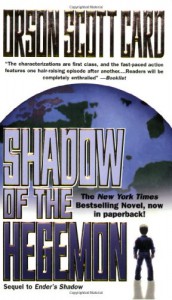37
Followers
12
Following
By Singing Light
Pretty much everything here originally appeared at my actual blog: By Singing Light. I particularly focus on upper middle-grade and young adult books. I also enjoy adult genre books, especially speculative fiction.
Currently reading
The Lost Tools of Learning and the Mind of the Maker
The Seventh Bride
Hope in the Dark
Outrun the Moon
Midnight Thief
The White Hart
The Great Wall Of Lucy Wu
Libriomancer
Elizabeth & Leicester: Power, Passion, Politics
 Opening: "Dear Admiral Chamrajnagar: I was given your idname by a mutual friend who once worked for you but now is a glorified dispatcher--I'm sure you know who I mean."
Opening: "Dear Admiral Chamrajnagar: I was given your idname by a mutual friend who once worked for you but now is a glorified dispatcher--I'm sure you know who I mean."I've been reading through the Ender and Bean books recently, because I never finished and I wanted to. I love the first books in both series and find them resonant on a deeper level than just cool scifi.
With Shadow of the Hegemon, I found my reactions to be quite different. While I was reading, I enjoyed the book and it pulled me right along. The tension between Peter and Bean is nicely played and I liked the after-the-war aspect of the story.
However (you did know that was coming, right?), when I had finished the book and was thinking about it afterward, I realized that quite a lot of it bothered me. The politics, for instance--the fact that Card automatically points to Russia as the bad guy, which seemed cheap and unthinking and easy.
This rest of this gets a bit spoilery, both for the Ender/ Bean series in general and this book in particular.
I liked the fact that Mr. and Mrs. Wiggin aren't as oblivious as they seem, and yet doesn't the fact that they've just been playing along with Peter and Valentine weaken the whole premise of the books--that adults consistently underestimate children, even when they know how smart they can be? Moreover, even while I agreed with Mrs. Wiggin, I really disliked the way the interaction she had with Bean about religion was portrayed.
And I felt cheated by Peter's big fulfillment moment--I still don't feel like I know Peter enough for this to work. I've seen him through Ender's eyes and, to some extent, through Valentine's, but I have not really seen him through his own. I want to care about Peter, but I don't yet and so I wanted to care about this moment, but I didn't. If it had come later in the book, I think it would have been much more effective.
The other criticism I have is with the resolution, or rather the this-is-a-series NON-resolution, of the Achilles plot. To be honest, it's about as ham-fisted as you can get and I was astounded that Card used essentially a bad pantomime trope.
At one point in this book, Petra recalls seeing a play which was explicitly designed to provoke sentiment and even though she realized that fact, she still felt what the play wanted her to. This book was like that, excet that I didn't feel the way I was supposed to. I was a little sad, a little happy, a little worried--but never once did I cry or cheer.
In the end, I simply don't know what to think about this book. It'll probably be one of the rare ones I don't rate on Goodreads. It is one thing while reading, and aother when the enveloping magic of the world has slipped away. Did I enjoy it? Yes. Will I keep reading? Probably, but all the time with one eye out for these problems, which means I'm less likely to be really sucked in, less likely to love.
Book source: public library
Book information: Tor, 2001; scifi
Orson Scott Card, previously












